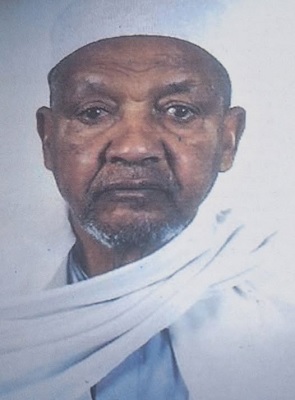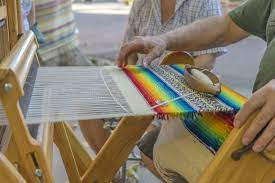
Whenever the month of Ramadan approaches, hundreds of Muslims from across the country flocked to Addis Ababa, knowing they would be met with kindness, empathy, and understanding to help navigate their struggles.
Hoping to receive support from him; and to observe the month of Ramadan joyfully, those individuals whom life has turned its back on them and burdened by hardship made their way to Addis Ababa, specifically to the place located around St Paul General Specialized Hospital, by its current name St. Paul’s Hospital Millennium Medical College.
Haji Toure, the philanthropist renowned for his generosity, never let them down and always met their needs, no matter what. He welcomed every guest with open arms.
For Haji Toure, being human is all that matters. Despite religious, ethnic, or other differences, his door is open to the disadvantaged segment of the society. Whether they came from long distances or nearby areas, Haji treated all with equal respect, ensuring that they received the support they sought.
Similarly, as the Ramadan nearing to conclude, Haji sent his guests back to their respective places with the support they needed; making sure that they received the assistance they sought and left happily and satisfied.
Years have elapsed since Haji Toure passed away. However, his name remains synonymous with unwavering generosity, kindheartedness, and thoughtfulness. His legacy as a beacon of kindness and compassion lives on not only among Muslims but also within the wider community. Especially, during the month of Ramadan, Haji is honored and remembered by many, not just by the beneficiaries of his kindness, but also by non-Muslims residing around St. Paul’s General Specialized Hospital and Merkato, who witnessed his profound acts of compassion.
Undoubtedly, they will also remember how the area would become crowded with people coming from all over the country to St, Paul and Merkato areas during the month of Ramadan.
According to a piece posted on the social media page of Cool Harari (2020), once the Addis Ababa City Municipality filed a complaint against Haji Toure, stating concerns that the people in his care were making the surrounding areas dirty. They suggested reducing the number of beneficiaries.
Surprisingly, Haji Toure did not simply accept this suggestion. “All of them are my guests. I don’t want to decrease their number; rather, I wish to increase it. Please, don’t touch them. Every year, I will pay the municipality for any increase,” he pleaded. In response, the city government agreed to his proposal, and began receiving the required fees from Haji.
Haji Toure was not only supportive for those who came to him during the month of Ramadan; but anyone who was trapped in the cycle of poverty and sought his help would leave with a lighter burden and a cheerful heart. His generosity and development initiatives are felt across Ethiopia, from Addis Ababa to Harar, where his work, including building numerous mosques, has left an indelible mark, transcending ethnicity and religion.
Former Journalist and writer, Teshome Berhanu, also shared the story of this generous man; widely recognized by the name ‘Haji Toure’. However, as Teshome stated, ‘Toure’ was not his real name; his true identity was Haji Muhammad Ahmed Abdosh.
As Teshome, he is also a writer, explained in a recent social media post titled “Two Famous Businessmen Honored in Addis Ababa During Ramadan,” that the nickname “Toure” is rooted in a common cultural practice among the communities of Harari and Somali, where individuals are often referred to by nicknames to express affectionate or a certain incident instead of formal names. In Haji Toure’s case, the nickname derived from the word “late,” reflecting that fact that he was born later than his expected due date. Accordingly, his nickname became the name most commonly used to address him, overshadowing his formal name.
Haji Toure, also known as Haji Muhammad Ahmed Abdosh, was born in 1921 and raised in Harar. Before moving to Addis Ababa and engaging in an import and export business, he was involved in trade in Harar and Dire Dawa.
Haji was known for his generosity; and was always eager to extend a helping hand to those in need, providing food, water, shelter as well as money. Mainly, in the Month of Ramadan, thousands of less privileged Muslims from the four corners of Addis Ababa were coming to his house located around St. Paul’s Hospital, to receive zakat, he added.
Haji was also dedicated to helping those who came to him seeking zakat. He slaughtered two to three oxen daily to provide meals for them to break their fast, he said adding that he provided clothing and financial assistance to those returning to their respective places to help them deal with life’s hardships, he added.
Haji Toure was not only deeply devoted to helping the needy, but also played a pivotal role in constructing hundreds of mosques equipping many of them with carpets, religious books, and kitabs while installing mills and generators in some mosques. Without exaggeration, it is possible to say that there were no development projects that he did not undertake. From Addis Ababa to Harar, one can trace his influence through the good work he left behind.
Especially in Harar and the surrounding areas, he established schools and also was used to pay the salaries of many imams, Teshome said referring to a book authored by Amir Yunus Haras under the titled “የምሥራቅ ፈርጦች” (translated as “Eastern pearls”), published in 2012.
As Teshome pointed out citing the Book, Haji Toure was almost the pioneer in all development activities carried out in Harar and the surrounding areas including Haramaya, Habro, Deno, Deder, Gelmeshira, Gelemso just to mention but a few.
He also made a significant impact through various development initiatives and emergency efforts in Wollo, particularly in areas such as Were Ilu, Woldia, Alamata, Kalu, and Mersa, among others.
However, as many people who knew him uttered, the philanthropic and developmental contributions of Haji Toure have not been adequately documented and celebrated. Despite his significant impact, the stories of his generosity and the transformative initiatives he led remain largely untold. Thus, it is vital to highlight and preserve his legacy, as it serves as an inspiration for future generations and a testament to the power of compassion and community engagement.
BY ELIZABETH MENGISTU
THE ETHIOPIAN HERALD SUNDAY EDITION 30 MARCH 2025




